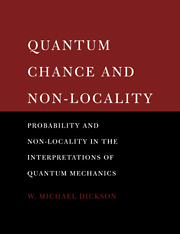 Quantum Chance and Non-locality
Quantum Chance and Non-locality 1 - Quantum probability and the problem of interpretation
Published online by Cambridge University Press: 11 September 2009
Summary
Quantum probability and quantum mechanics
The formalism of quantum probability theory
Discussions of quantum mechanics are often confused by a lack of clarity about what exactly constitutes ‘quantum mechanics’. It is therefore useful to try at the start to isolate a consistent mathematical core of quantum mechanics, and consider anything that goes beyond this core to be ‘interpretation’. For us, this core is quantum probability theory.
Quantum probability is a generalization of classical probability, and therefore I begin with a brief review of the latter. I assume that the reader has some familiarity with the ideas of probability theory. What follows is just to provide a quick review, and to establish some notation and terminology.
In modern classical probability theory, probabilities are defined over algebras of events. The motivation is straightforward: we begin with a set of ‘primitive’, or ‘simple’, events (the ‘sample space’), and form an algebra of events by taking all logical combinations of the simple events. For example, let us take the simple events to be the possible results of rolling a six-sided die one time, so that the sample space is the set {1,2,3,4,5,6}. We then form an algebra of events from the sample space by taking all possible logical combinations of the simple events. Logical combinations include, for example, ‘either 3 or 5’ and ‘not 3 and not 2’.
- Type
- Chapter
- Information
- Quantum Chance and Non-localityProbability and Non-locality in the Interpretations of Quantum Mechanics, pp. 3 - 23Publisher: Cambridge University PressPrint publication year: 1998


